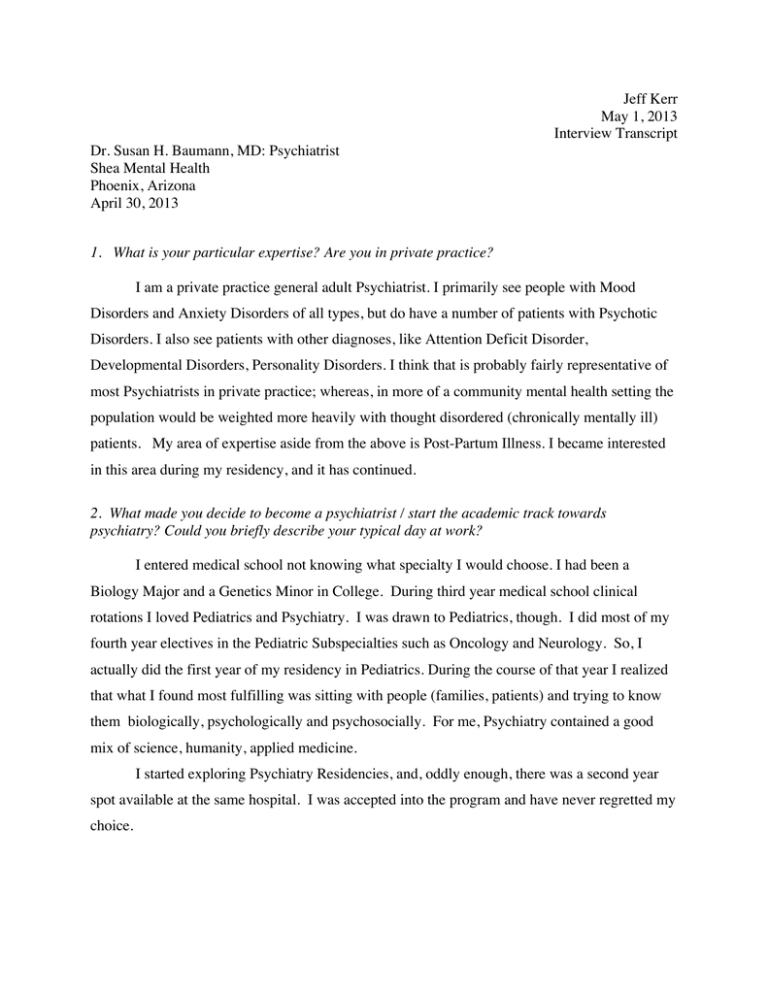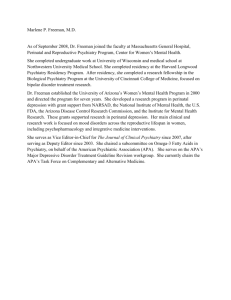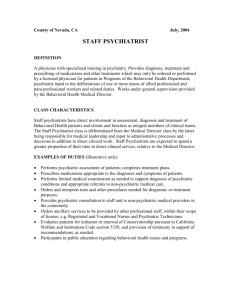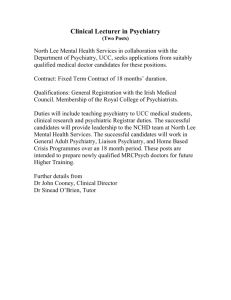Jeff Kerr May 1, 2013 Interview Transcript Dr. Susan H. Baumann, MD: Psychiatrist
advertisement

Jeff Kerr May 1, 2013 Interview Transcript Dr. Susan H. Baumann, MD: Psychiatrist Shea Mental Health Phoenix, Arizona April 30, 2013 1. What is your particular expertise? Are you in private practice? I am a private practice general adult Psychiatrist. I primarily see people with Mood Disorders and Anxiety Disorders of all types, but do have a number of patients with Psychotic Disorders. I also see patients with other diagnoses, like Attention Deficit Disorder, Developmental Disorders, Personality Disorders. I think that is probably fairly representative of most Psychiatrists in private practice; whereas, in more of a community mental health setting the population would be weighted more heavily with thought disordered (chronically mentally ill) patients. My area of expertise aside from the above is Post-Partum Illness. I became interested in this area during my residency, and it has continued. 2. What made you decide to become a psychiatrist / start the academic track towards psychiatry? Could you briefly describe your typical day at work? I entered medical school not knowing what specialty I would choose. I had been a Biology Major and a Genetics Minor in College. During third year medical school clinical rotations I loved Pediatrics and Psychiatry. I was drawn to Pediatrics, though. I did most of my fourth year electives in the Pediatric Subspecialties such as Oncology and Neurology. So, I actually did the first year of my residency in Pediatrics. During the course of that year I realized that what I found most fulfilling was sitting with people (families, patients) and trying to know them biologically, psychologically and psychosocially. For me, Psychiatry contained a good mix of science, humanity, applied medicine. I started exploring Psychiatry Residencies, and, oddly enough, there was a second year spot available at the same hospital. I was accepted into the program and have never regretted my choice. 3. How do modern advances in neuroscience, like the use of neuroimaging, affect how you practice as a physician? I started my own practice right out of residency. Initially I combined hospital work (inpatient) with my out-patient practice. For the past 20 years I have only seen out-patients. I have always spent 25-30 hours/week in the office, seeing patients. For me this has been a perfect schedule. I love the flexibility of making my own schedule. I work very hard when I am in the office; but I also need the time away. I feel like I am actually a better physician because I do take the time to have a balanced life. My practice is actually different than most psychiatrists in private practice in that I still do psychotherapy. About 1/3 of my practice is psychotherapy based… meaning that I see patients for 50 minute sessions weekly to monthly. The remainder of my day is spent doing medication management appointments which are 15 minutes; or, 30 minute visits for more complex patients or patients who just want/need to talk. I like the variety. I do office management (bookkeeping, reports, reading) from home. I share office space with another Psychiatrist and a Child/Adolescent Psychologist. I am very grateful for the opportunity to practice medicine in this specialty. I can really sit with my patients, know them and be a part of their lives. I definitely have a strong connection with them, and I love the continuity. I am now even seeing adult children of some of my first patients! I have also witnessed enormous changes in neuroscience, pharmacogenetics, heritability factors, epigenetics, neurotransmitter theories, localization of brain function, etc. 4. What do you, or other psychiatrists, consider before accepting new medical or pharmaceutical research into your methodology? Do you see any issues (advantages / disadvantages) with the way medical research is currently conducted? As you probably know, our understanding of genetics has exploded, from just a basic understanding 30 years ago to the complex and clinically relevant status today. And, it is probably still just in its infancy. The same goes for our understanding of neurotransmitters. Serotonin, norepinephrine, dopamine were all just being identified when I was in medical school; and, the psychotropic medications that target these neurotransmitters came out during my residency. They have revolutionized the treatment of mental illness. Now, with more advanced neuroimaging techniques we are able to identify very specific receptors, in very specific parts of the brain, that all have very specific and unique functions. I'm sure that new psychotropics will be much more specific in terms of targeting brain areas and/or receptors. These advanced neuroimaging techniques are not readily available to the general medical community, other than in research or academic settings. Of course we have widely available CT Scans and Magnetic Resonance Imaging... and although they were cutting edge 20-30 years ago, they often are used a screening diagnostic tests (in psychiatry usually used to rule out other pathological processes). Now there are the more specific MRA's for localization of function within the brain, although I have never ordered one in my practice. Pharmacogenetic testing is already available. I have yet to find it especially useful because the information was already apparent to me from the patient's clinical response. I think it has not been developed sufficiently at this point. With regard to accepting new pharmaceutical research into my practice, I wait until a medication has been approved by the FDA and is available to the public. I do not personally participate in research studies. I try to regularly read as many general medical and Psychiatry journals as I possibly can, some of which are American Journal of Psychiatry, Journal of Clinical Psychiatry, Psychiatric Annals, Medical Letter, Journal Watch Psychiatry, and Psychiatry Drug Alerts. I also talk to colleagues and attend conferences pertinent to my practice. We have pharmaceutical representatives who come by to market their products. Although their purpose seems self-serving (sales people), they provide us with a hefty supply of samples, which we can dispense, for free to patients who would otherwise be unable to afford their medications. They also do provide useful information about new products (for example, how are other psychiatrists prescribing this medication in the community, common side effects and so on). I try to prescribe medications for FDA approved uses. I may, however, prescribe a medication for an “off-label” use (an illness or syndrome for which that particular medication has not officially been approved, usually because it has not been studied). I prescribe off label medications if there is a compelling medical reason to do so, especially if that is the standard of care in the medical community and the benefits outweigh the risks. Although I make every attempt to carefully read and analyze journal articles (research), I am not an expert on how medical research is conducted at present; so, I can’t really offer an intelligent opinion. I will say, though, that certain populations are very difficult to study. Children and pregnant women are prime examples of this. It is understandably impossible to do many prospective or double blind studies on these populations experimentally. So, for example, in the case of pregnant women, we often rely upon retrospective data, case reports. A good example of the above is the present study that Mass General Hospital (Harvard Medical School) is doing on the use of anti-psychotic medications in pregnancy. They have contacted practitioners nationwide asking that any patients being treated with atypicalantipsychotic medications during their pregnancies participate in the study… A “registry” of sorts. For now, that is the only way to study effects of these medications on pregnant women. Thank you! Good luck!







